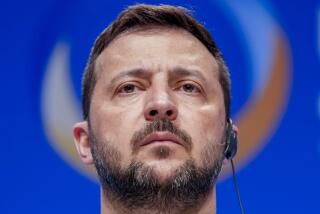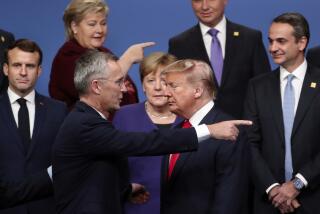‘Old Europe’ Feeds Hussein’s Suicidal Fantasy
- Share via
While the American media are having a field day against the “old Europeans” -- France and Germany -- the Iraqi media are building a fantasy world in which a resurgent Europe, inspired by Saddam Hussein’s “heroic leadership,” will put an end to the U.S. “quest for global hegemony.”
Despite the protests of French President Jacques Chirac, German Chancellor Gerhard Schroeder and others opposed to war in Iraq that they do not endorse Hussein’s brutal regime, the Iraqi press sees it differently. Iraq’s media are trying to create the impression that Hussein enjoys worldwide support that cuts across ideological barriers.
“The battle started in Iraq,” wrote Hussein’s eldest son, Uday, in an editorial in his daily newspaper Babel on Saturday. “But the struggle of mankind against the American-Zionist enemy has now spread to the whole world. The world is waking up and responding to the call of our Heroic Leader.”
Uday’s television station showed footage of the “peace” rallies in the West for seven hours on four successive days. Every 10 minutes or so a portrait of Hussein would appear. A solemn voice-over read the message: “The world says: Yes to Saddam.”
Footage of Chirac and Schroeder was also offered, along with the claim that they were working “tirelessly and heroically” to prevent “an American-Zionist aggression” against Iraq.
Iraqi newspapers and radio and television networks, all controlled by Hussein or his family, refer to the German leader as al-munadhil al-bassel (the brave combatant) because of the stance he has taken against the U.S. and in favor of Iraq. This is an important title in the Iraqi Baathist lexicon, just one degree below the title of al-munadhil al-akbar (the great combatant), used to describe Chirac, the only Western head of state to have met Hussein and to have forged a personal relationship with him in the 1970s.
On the side of the “villains” are British Prime Minister Tony Blair and his Italian and Spanish counterparts Silvio Berlusconi and Jose Maria Aznar.
Hussein’s Iraq is building up other heroes. France’s National Front leader Jean-Marie Le Pen, Austria’s neofascist leader Joerg Haider, American social critic Noam Chomsky, Russian Communist Party leader Gennady Zyuganov, Columbia professor Edward Said, British Labor Party leftist Tony Benn, German Foreign Minister Joschka Fischer and Jesse Jackson are some of the Iraqi “heroes.”
The warmest Iraqi accolades, though, go to Schroeder and Chirac, who are believed to have the clout to prevent Washington from getting a second resolution through the United Nations Security Council.
The newspaper Babel has praised Schroeder’s policy as “an attempt to assert German honor under American occupation.”
“Iraq’s resistance has given Germany the courage to reassert its independence,” the daily Al-Thawrah (the Revolution), the official organ of the Baath Party, said in an editorial Feb. 12. “Saddam Hussein led the way, and Schroeder, the courageous combatant, followed.”
Ultimately, it is to France that the Iraqi leaders look to wage diplomatic war against the United States. France can still delay the passage of a new resolution or use its veto. The Iraqi elite appears to be convinced that if war does not come within the next few weeks, it never will. Hussein clearly hopes that France will get him those precious few weeks.
The net effect of the Franco-German policy, however, could prove deadly for Hussein. By persuading him -- even unintentionally -- that he could remain in power without fulfilling his commitments to the Security Council, the “old Europeans” may have contributed to Hussein’s refusal to disarm.
“True friends would have urged Saddam to accept genuine disarmament, and thus prevent war,” said former Iraqi Foreign Minister Adnan Pachachi.
More to Read
Sign up for Essential California
The most important California stories and recommendations in your inbox every morning.
You may occasionally receive promotional content from the Los Angeles Times.










